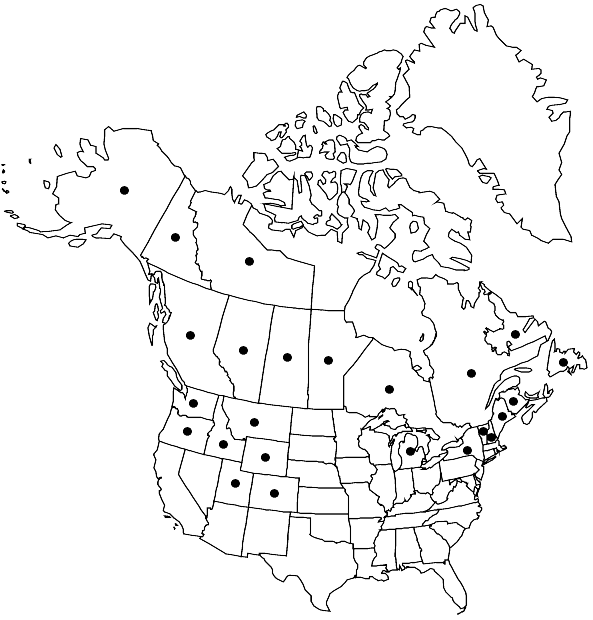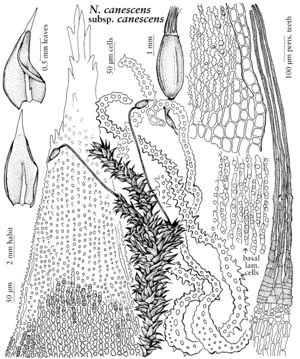Difference between revisions of "Niphotrichum canescens subsp. canescens"
FNA>Volume Importer |
imported>Volume Importer |
||
| (6 intermediate revisions by 2 users not shown) | |||
| Line 1: | Line 1: | ||
{{Treatment/ID | {{Treatment/ID | ||
|accepted_name=Niphotrichum canescens subsp. canescens | |accepted_name=Niphotrichum canescens subsp. canescens | ||
| − | |accepted_authority= | + | |accepted_authority= |
|publications= | |publications= | ||
|basionyms= | |basionyms= | ||
| Line 18: | Line 18: | ||
|elevation=low to high elevations (0-4200 m) | |elevation=low to high elevations (0-4200 m) | ||
|distribution=Alta.;B.C.;Man.;N.B.;Nfld. and Labr.;N.W.T.;Ont.;Que.;Sask.;Yukon;Alaska;Colo.;Idaho;Maine;Mich.;Mont.;N.H.;N.Y.;Oreg.;Utah;Vt.;Wash.;Wyo.;Europe;Asia (Siberia). | |distribution=Alta.;B.C.;Man.;N.B.;Nfld. and Labr.;N.W.T.;Ont.;Que.;Sask.;Yukon;Alaska;Colo.;Idaho;Maine;Mich.;Mont.;N.H.;N.Y.;Oreg.;Utah;Vt.;Wash.;Wyo.;Europe;Asia (Siberia). | ||
| − | |discussion=<p>Subspecies canescens occurs across the continent from British Columbia, Washington, and Oregon to Newfoundland, with the southernmost extensions to the Rocky Mountains of Colorado and the northernmost station at Lake Iliamna in southern Alaska. It is highly variable; doubtless the differing phenotypes are reactions to varying environmental conditions. The most common phenotype comprises robust plants with broad and typically concave leaves that are falcate along the whole stem and are long-pilose with awns that merge with large hyaline apical parts of the leaves. The opposite extreme is plants with thin shoots and almost elliptical, non-falcate, spoon-shaped, and cucullate leaves that have a short and strait awn or are muticous.</p> | + | |discussion=<p>Subspecies canescens occurs across the continent from British Columbia, Washington, and Oregon to Newfoundland, with the southernmost extensions to the Rocky Mountains of Colorado and the northernmost station at Lake <i>Iliamna</i> in southern Alaska. It is highly variable; doubtless the differing phenotypes are reactions to varying environmental conditions. The most common phenotype comprises robust plants with broad and typically concave leaves that are falcate along the whole stem and are long-pilose with awns that merge with large hyaline apical parts of the leaves. The opposite extreme is plants with thin shoots and almost elliptical, non-falcate, spoon-shaped, and cucullate leaves that have a short and strait awn or are muticous.</p> |
|tables= | |tables= | ||
|references= | |references= | ||
| Line 27: | Line 27: | ||
-->{{#Taxon: | -->{{#Taxon: | ||
name=Niphotrichum canescens subsp. canescens | name=Niphotrichum canescens subsp. canescens | ||
| − | + | |authority= | |
| − | |authority= | ||
|rank=subspecies | |rank=subspecies | ||
|parent rank=species | |parent rank=species | ||
| Line 41: | Line 40: | ||
|publication year= | |publication year= | ||
|special status= | |special status= | ||
| − | |source xml=https:// | + | |source xml=https://bitbucket.org/aafc-mbb/fna-data-curation/src/2e0870ddd59836b60bcf96646a41e87ea5a5943a/coarse_grained_fna_xml/V27/V27_394.xml |
|subfamily=Grimmiaceae subfam. Racomitrioideae | |subfamily=Grimmiaceae subfam. Racomitrioideae | ||
|genus=Niphotrichum | |genus=Niphotrichum | ||
Latest revision as of 21:26, 5 November 2020
Plants mostly large. Leaves broadly ovate-lanceolate to ovate, often distinctly curved throughout the shoots, very broadly canaliculate distally, hyaline in the uppermost part and merging with the awn, making it very broad; awns not or weakly decurrent, distinctly denticulate and spinulose towards the apex.
Habitat: Sandy or gravelly soils and fine rock-debris, acidic or calcareous substrates in rather dry situations, soil or humus over rock ledges along roadsides, gritty soil at lake shores, grassland and heaths, exposed boulders along streams and creeks and on dunes
Elevation: low to high elevations (0-4200 m)
Distribution

Alta., B.C., Man., N.B., Nfld. and Labr., N.W.T., Ont., Que., Sask., Yukon, Alaska, Colo., Idaho, Maine, Mich., Mont., N.H., N.Y., Oreg., Utah, Vt., Wash., Wyo., Europe, Asia (Siberia).
Discussion
Subspecies canescens occurs across the continent from British Columbia, Washington, and Oregon to Newfoundland, with the southernmost extensions to the Rocky Mountains of Colorado and the northernmost station at Lake Iliamna in southern Alaska. It is highly variable; doubtless the differing phenotypes are reactions to varying environmental conditions. The most common phenotype comprises robust plants with broad and typically concave leaves that are falcate along the whole stem and are long-pilose with awns that merge with large hyaline apical parts of the leaves. The opposite extreme is plants with thin shoots and almost elliptical, non-falcate, spoon-shaped, and cucullate leaves that have a short and strait awn or are muticous.
Selected References
None.
